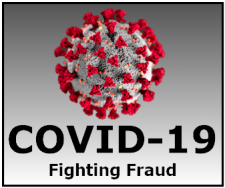Keep safe against COVID-19 scams
As if we didn’t have enough problems already with the shutdowns of businesses, schools and government offices to help curb the spread of the coronavirus, we also now have to deal with the inevitable outbreak of scammers.
On top of the selfish folks curbing the market on essentials such as toilet tissue and cleaning supplies to try to make a quick buck – like those brothers in the Chattanooga area who bought 20,000 bottles of hand sanitizer and tried to sell them online at inflated prices – we now have scammers calling, emailing us, or coming to our doors attempting to steal our money through our coronavirus fears.
Anderson County Sheriff’s Office says one scam is based on a “mobile testing van,” asking people to pay for a mobile COVID-19 test. There is no such thing.
One scam the Federal Trade Commission and banks are warning about is robocallers pretending to be from the government and trying to get people to give them bank account and Social Security numbers so they can “deposit” the supposed $1,000 coronavirus stimulus checks in people’s bank accounts.
First, that stimulus money has been proposed by President Trump and is under consideration by Congress, but it hasn’t yet been approved, and might never be.
Second, even if it does get approved, the FTC says nobody from the government is going to be calling people to get information on how to send them the money.
Police in some areas are warning about online scams that tell people the (fill in the blank) supermarket chain is offering a free year’s supply of groceries, while they’re really just trying to steal people’s personal information.
One thing people can count on in bad times are scams, and we are going to see more of them as the virus lockdown plays out.
Price-gouging is one of the most-common scams. Just searching for “hand sanitizer” on eBay will show how bad that’s getting.
The Federal Trade Commission has dedicated part of its website to informing people about the scams (see consumer.ftc.gov/features/coronavirus-scams-what-ftc-doing).
The FTC says:
“Hang up on robocalls. Don’t press any numbers. Scammers are using illegal robocalls to pitch everything from scam Coronavirus treatments to work-at-home schemes. The recording might say that pressing a number will let you speak to a live operator or remove you from their call list, but it might lead to more robocalls, instead.
“Fact-check information. Scammers, and sometimes well-meaning people, share information that hasn’t been verified.
“Know who you’re buying from. Online sellers may claim to have in-demand products, like cleaning, household, and health and medical supplies; they don’t.
“Don’t respond to texts and emails about checks from the government. The details are still being worked out. Anyone who tells you they can get you the money now is a scammer.
“Don’t click on links from sources you don’t know. They could download viruses onto your computer or device.
“Watch for emails claiming to be from the Centers for Disease Control and Prevention (CDC) or experts saying they have information about the virus.”
For the most up-to-date information about the Coronavirus, visit the Centers for Disease Control and Prevention (CDC) and the World Health Organization (WHO).
“Ignore online offers for vaccinations. There currently are no vaccines, pills, potions, lotions, lozenges or other prescription or over-the-counter products available to treat or cure Coronavirus disease 2019 (COVID-19) — online or in stores.
“Do your homework when it comes to donations, whether through charities or crowdfunding sites. Don’t let anyone rush you into making a donation. If someone wants donations in cash, by gift card, or by wiring money, don’t do it.”
More information about COVID-19 scams may be found on the U.S. Department of Justice website at www.justice.gov/usao-wdva/covid-19-fraud.



